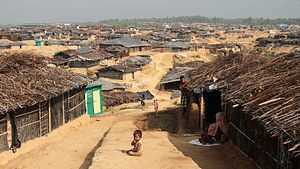For four decades, Rohingya refugees and exiles have been imploring the world to recognize that what is happening in Myanmar is nothing short of genocide. Aside from a few exceptions, their calls have been thwarted by the preference of world leaders, states, and multilateral organizations for the more cautious, legally directionless, and nebulous term “ethnic cleansing.” But Rohingya appeals have now finally been answered with the publication of a report by the UN’s Independent International Fact-Finding Mission on Myanmar.
In what must be an excoriating read for Myanmar’s generals and politicians, the report accuses them of indiscriminate killings, large-scale gang rapes, and the torching of entire villages in attacks described as “widespread and systematic” and which had “genocidal intent.” Most significantly, the report calls for the top brass of Myanmar’s security forces, the Tatmadaw, to face the International Criminal Court for genocide as well as for crimes against humanity and war crimes. There is scathing criticism too of Aung San Suu Kyi, Nobel laureate and de facto leader of the country, for failure to use her position or her moral authority to prevent the developments in Rakhine state.
What then are the real world implications and the significance of this report? For Rohingya spokesperson Nay San Lwin of the Free Rohingya Coalition, the answer is crystal clear:
This report is based on 875 in-depth interviews with victims and eyewitnesses and a vast amount of other primary information. And the findings are clear and damning. There are no more excuses we want to listen to. Our slogan for the Rohingya Genocide Remembrance Day anniversary we commemorated on 25th August was “Never Again.” Now every concerned organization and every government must wake up to that unfulfilled pledge and stop what is happening in Myanmar in Rakhine, Kachin, and Shan states.
The response of the international community may not be so categorical, however. The reaction will be measurable come September 18, when the full report is to be published. But it is already clear that “business as usual” may be the order of the day. The United Kingdom, which leads the United Nations Security Council on Myanmar issues, reiterated its desire to see the outcome of Myanmar’s own domestic investigations.
In contrast, Christopher Sidoti of the Fact Finding Mission did not mince his words at the press conference launching the report: “Expecting justice and truth from any Myanmar domestic process is simply naive. There is no will and no capacity.”
Yet hitherto, as Mark Farmaner of Burma Campaign UK has pointed out, no world power has come forward to state their acceptance of the Fact-Finding Mission’s recommendations and seek their immediate implementation. The authors are in no doubt about the realpolitik surrounding their unprecedented report. Indeed they felt it necessary to point a finger at various entities of the UN itself, and chided them for their lack of cooperation and for prioritizing quiet diplomacy with Myanmar over and above addressing human rights concerns.
This will be galling to Rohingya activists like Razia Sultana of Rohingya Women’s Welfare Society, who works in the Rohingya refugee camps of Bangladesh. She said, “Look, Myanmar blocks independent investigations, they restrict humanitarian access and they stop and imprison journalists whilst at the same time they deny responsibility for all crimes. Can you believe this? Surely the international community needs to end this impunity now?” Sultana’s greatest fear is that there will be a new round of hollow condemnations of Myanmar without any action. The danger here is that if the only categorical and emphatic call for investigation and prosecution to date is stymied, then this will only serve to embolden the culture of Tatmadaw oppression in Myanmar.
It is in the bleak refugee camps where the implications of the report will probably be felt the least. In this disaster zone where people have few choices, certainly the report is at least an acknowledgement of what the refugees have painfully borne witness to, and is an affirmation of their testimony. The report’s authors emphasize that in Myanmar, “The Rohingya are in a continuing situation of severe systemic and institutionalized oppression from birth to death.” For Rohingya in the camps of Bangladesh, all 1.2 million of them, who are unable to go home, unable to work or travel freely, or study or plan a future, it may not feel very different.
It is in this context that the report has called for a trust fund to support the victims through psychosocial and livelihood support, legal aid, and other means of assistance. And that may be the only tangible outcome of the mission.
Shafiur Rahman is a documentary maker who has spent the last 21 months working exclusively on Rohingya issues. Rahman’s work has appeared on CNN, BBC, and other channels. Follow him on Twitter: @shafiur

































